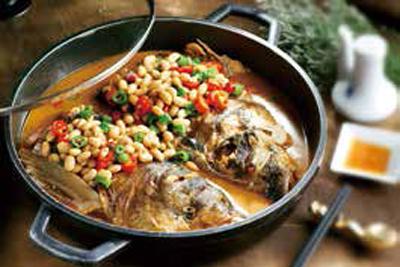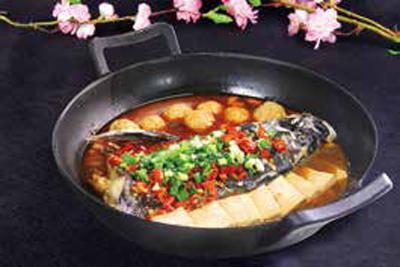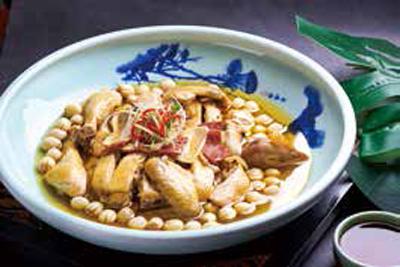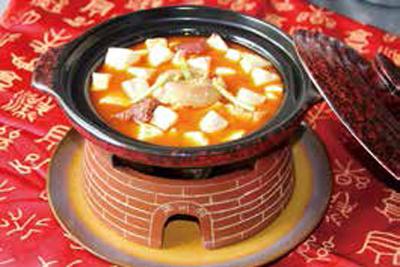Lifetime Dedication to Tasty Food
2019-02-25HuangShujuan
Huang Shujuan
Wang Yongjun founded Yanzhoufu Restaurant in 1998 in Jiande. With a focus on the regional geography, culture and delicacies of the county-level city about 140 kilometers from Hangzhou, the restaurant brought back the best of the local cuisine. In history, Jiande was a core part of Yanzhou Prefecture in the northwestern part of Zhejiang Province. Yanzhoufu in three Chinese characters stand for this ancient name of the prefecture. The prefecture used to be an important part of the province. However, a large reservoir and a hydraulic power station were built in the 1950s there and a big part of Jiande went under. People uprooted themselves and moved to other parts of the province. It seemed that for a while, history, culture and all the glory of the region went under, too.
So it can be said that the setup of Yanzhoufu Restaurant was more than an epoch-making event in the restaurant industry in Jiande. It signified a cultural and historical comeback for Jiande.
As the Xinan River and the Lan River traverse Jiande and come together to form Fuchun River where it continues eastward toward Hangzhou, fish is a key constituent of the local cuisine. Wang picked the head of the bighead carp as the star dish on the menu of the flagship Yanzhoufu Restaurant. When he was a young boy, his favorite delicacy was the hot fish head together with tofu and snail cooked by his maternal grandmother. He improved his grandmas recipe after many experiments. The menu he developed for the restaurant and for large crowds of gourmets presented a number of specials with local characteristics. The restaurant was decorated with the motif that featured local history, culture, folklore, and culinary excellence. It was a huge success.

Fish Head of Nine-Surname Fishermen, a star dish on the menu of Yanzhoufu Restaurant

Hot Fish Head, a star dish on the menu of Yanzhoufu Restaurant

Lotus Seeds and Chicken, a dish on the menu of Yanzhoufu Restaurant

Tofu, a dish on the menu of Yanzhoufu Restaurant
In November 2002, he opened Yanzhoufu Restaurant in Hangzhou. Jiande, Yanzhoufu Restaurant, and the culture-related motif of the restaurant caused a stir in the restaurant industry and media of Hangzhou. The restaurant became phenomenal as gourmets flooded in to try the delicacies so special and so yummy.
However, Yanzhoufu Restaurant in Hangzhou was never the future of Wang Yongjun. It was and is a window in Hangzhou on the history, culture and cuisine of Jiande. His roots are in Jiande and all the resources for future growth are in his hometown.
In 2006, Wang Yongjun shifted his focus back to Jiande as new opportunities popped up there. He purchased a plot of six hectares and planned to build a food processing center there. In 2007 he upgraded Yanzhoufu Restaurant in Jiande through a refurbishment project. In 2008 he started another brand which focused on high-end food products.
In 2010, his food processing business became operational and began marketing semi-finished vacuum-packed traditional dishes. With the recipe and cooking instructions printed on the package and all the ingredients inside, a bag of semi-finished dish could be easily turned into a classy delicate dish in kitchen. Such dishes make cooking much easier for home cooks who dont have expertise to make a restaurant-class dish. And packed dishes save time and resources for restaurant kitchens where such dishes are in great demand. The semi-cooked dishes remarkably enhance profitability at these restaurants. Wang Yongjuns standardized central kitchen opened up a huge market.
Now Yanzhoufu Food Company markets several series of fish dishes, pork dishes and other dishes with regional characteristics. These products were developed in partnership with Zhejiang Academy of Agricultural Sciences, Zhejiang Agricultural and Forestry University, Zhejiang Gongshang University and Jiangnan University. The company serves as a central kitchen, providing food products and services to food businesses largely in East China and radiating out to the whole country. Take Sautéed Sweet and Sour Pork Tenderloin for instance. It is one of the semi-finished vacuum-packed dishes produced by Wangs business and it alone brings in 30 million yuan in sales a year.
A restaurant chain, standardized industrialized food production, and brands, are three major components of Wang Yongjuns business matrix.
“Food is more than tradition; food business is much more than keeping tradition alive. Innovation and fusion are musts. It is my lifelong ambition to keep producing tasty food,” comments Wang Yongjun in an interview.
